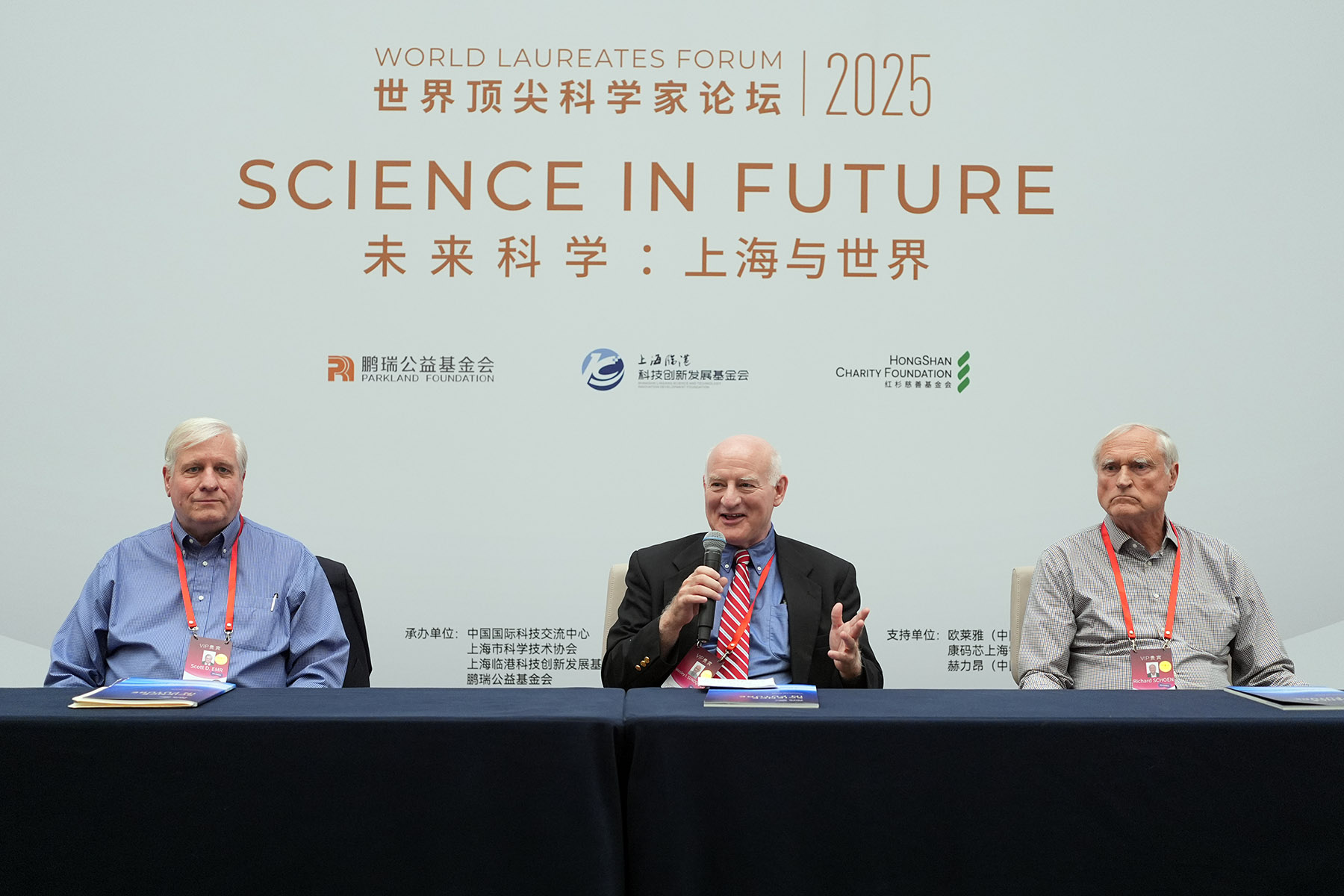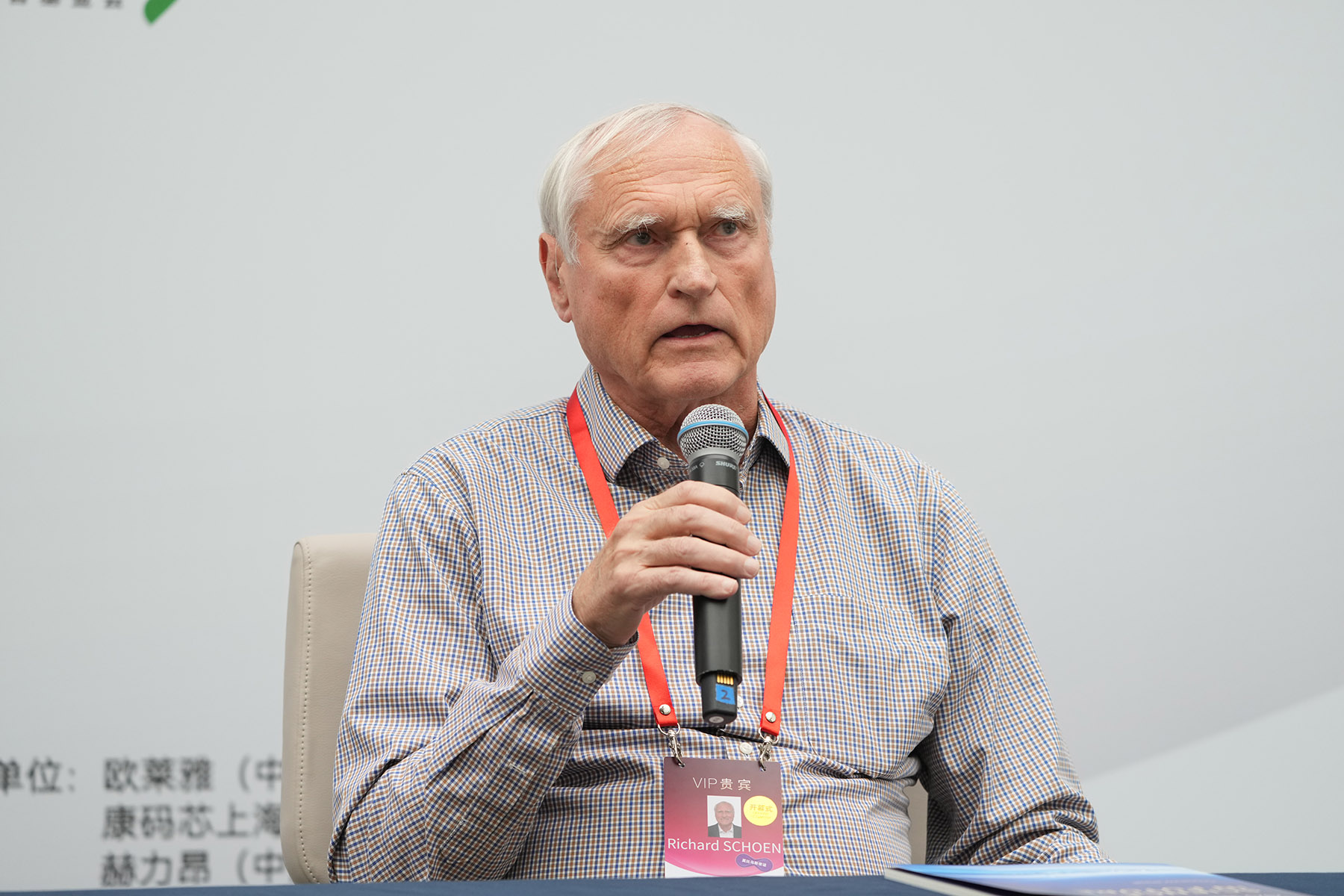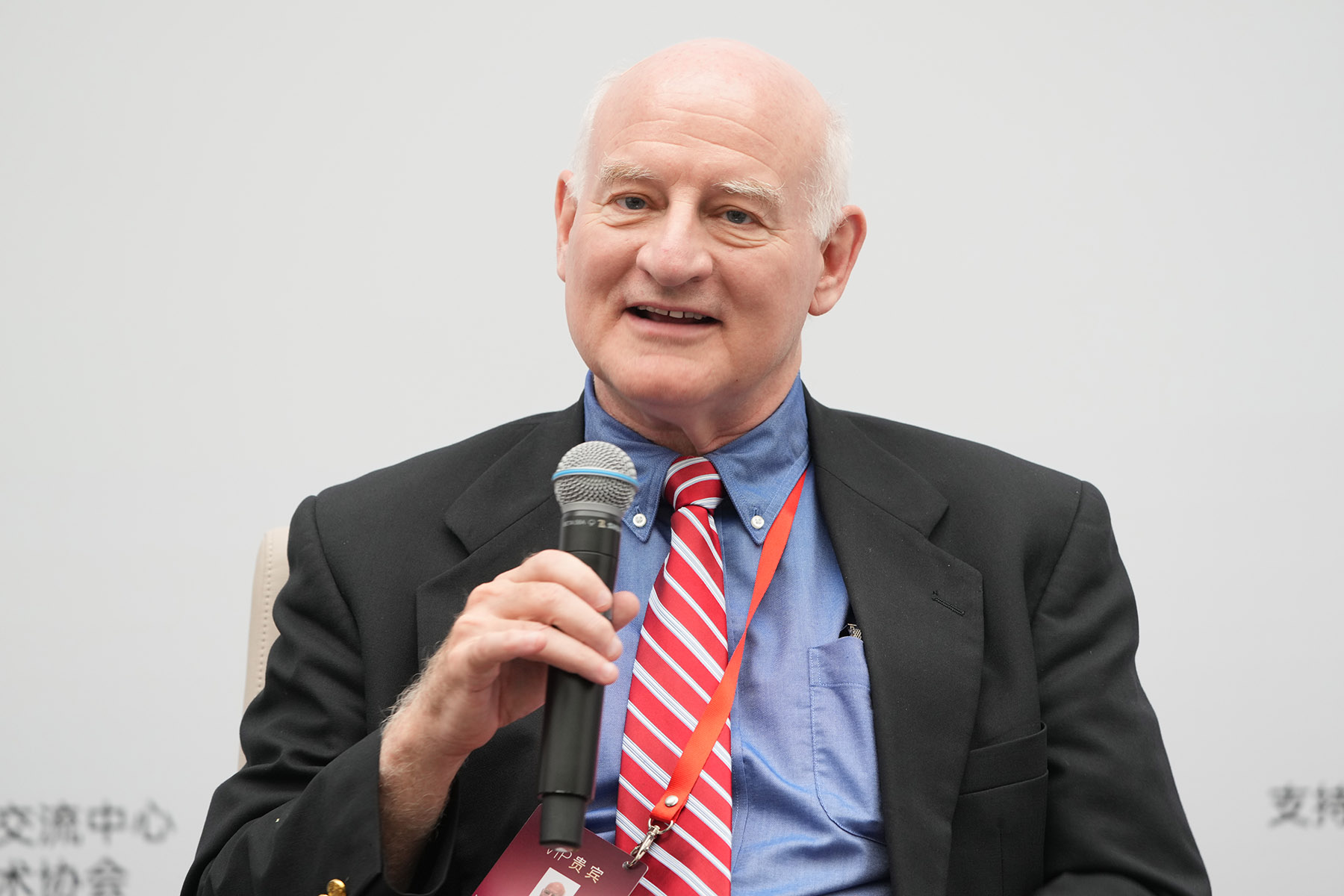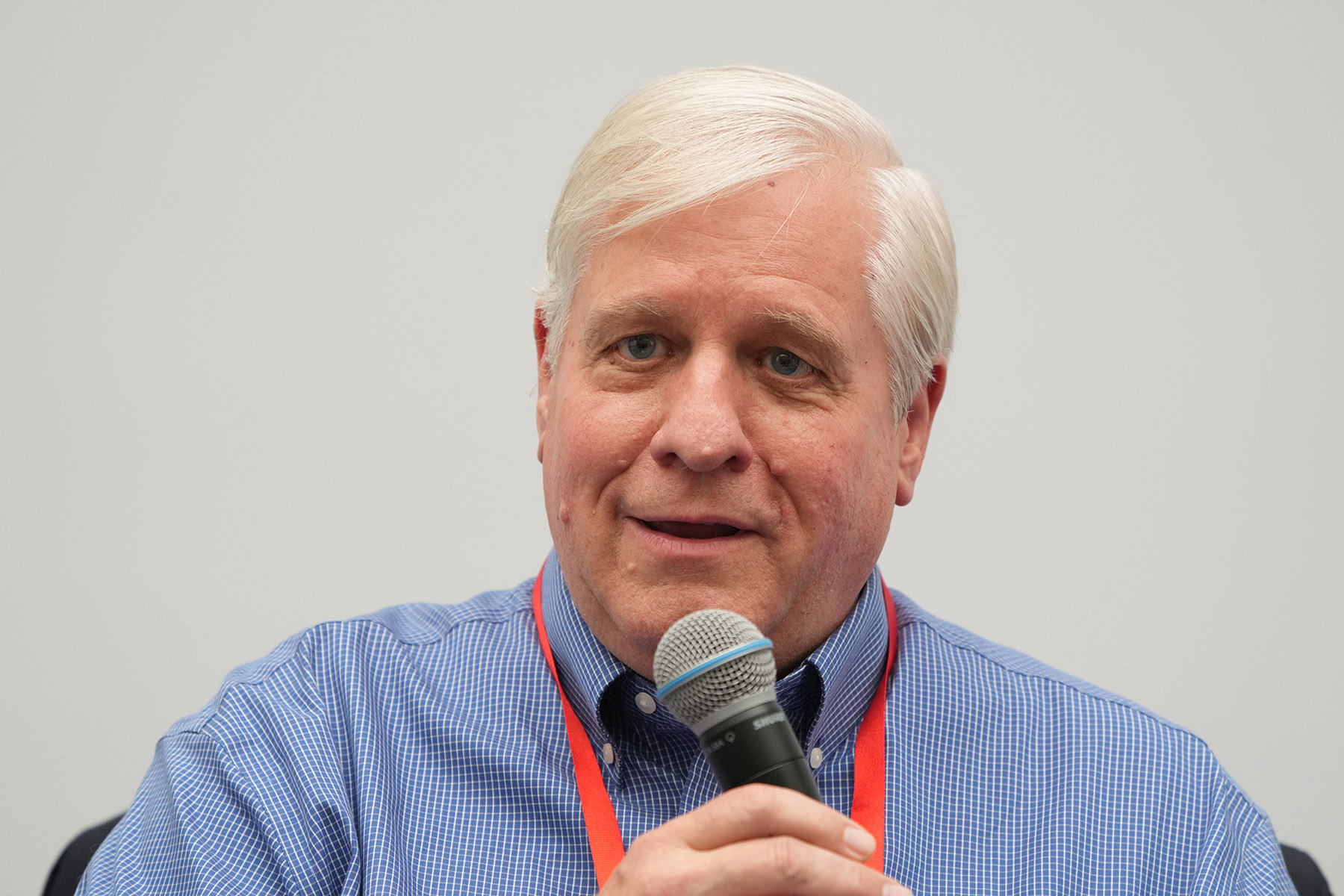The three winners of this year's World Laureates Association Prize say China faces an exciting era of research in mathematics, neurodegenerative diseases and molecular biology, Zhou Wenting reports.

The three winners of the 2025 World Laureates Association (WLA) Prize have praised China for its strength in their respective areas of research, and say winning the award will boost their cooperation with the Chinese scientific community.
Speaking at a media event at the 2025 World Laureates Forum, held in Shanghai from Oct 24 to 26, the three laureates, who all come from the United States, said there is an exciting future ahead as they expect China to become a world leader in their various fields.
Scott D Emr, recipient of the 2025 WLA Prize in Life Science or Medicine and a professor of molecular biology and genetics at Cornell University, says that China has developed a huge interest in neurodegenerative diseases, to which his research relates, and there are amazing studies being conducted in the country right now focusing on Alzheimer's disease, Parkinson's disease and amyotrophic lateral sclerosis, among others.
"One of China's advantages lies in its far greater flexibility than some other countries, including the US, in pursuing certain model systems like the mouse models and others in pursuing these diseases," says Emr. "So I see China as actually somewhat leading the way now in the research of several of these new degenerative diseases."

Wesley I Sundquist, another winner of the 2025 WLA Prize in Life Science or Medicine, says that China is truly a leader in his specialty, which concerns the structure of HIV and host proteins that interact with the virus.
"Two Chinese nationals, one now working at Oxford University and the other at the University of California, San Francisco, are really the world leaders. It's also true that Tsinghua University in Beijing has been one of the world-leading centers for electron microscopy, and this is just exploding," says Sundquist, Samuels Professor and co-chair of the Department of Biochemistry at the University of Utah.
"Electron microscopy allows us to understand biology by actually looking at structures inside cells now, and it's very clear that China is going to be one of the leaders in this area," he says.
Although not fundamentally an expert on drug development, Sundquist says that friends in the pharmaceutical field frequently tell him that synthetic chemistry is truly at the cutting edge in China.
In addition, he explains that major pharmaceutical companies in Europe and the US have established research institutes here in China, which are evolving at an accelerated pace. "They perceive China as a critical research center, and so I just see this further developing on a very strong trajectory," says Sundquist.
Richard Schoen, laureate of the 2025 WLA Prize in Computer Science or Mathematics, also says that China is very strong in his field: differential geometry and mathematical physics.
"Geometric analysis is one of the historically prominent areas for China. In fact, I've had at least 20 PhD students from China. I am already pretty well-connected here among mathematicians, and I certainly expect that to continue," says Schoen, a professor emeritus at the School of Humanities and Sciences at Stanford University.

Aiming to recognize and support eminent researchers and technologists worldwide for their contributions to science, the WLA Prize was established in Shanghai in 2021.The prize is also intended to support global science and technology advancement, addressing the challenges to humanity and promoting society's long-term progress.
The WLA Prize has two categories, with each offering a monetary award of 10 million yuan ($1.4 million), making it one of the most lucrative scientific awards globally. Since its inception, the WLA Prize has honored 15 scientists from Germany, the US, Belgium, the United Kingdom and Switzerland over five editions, including this year's, and its international influence and prestige are rising.
Receiving the awards in Shanghai also brought this year's three scientists to China for the first time.
"I've had interactions with a number of Chinese scientists and the opportunity to come to China and meet with people at many different universities certainly opens the door to more opportunities for collaboration, and for the growth of the bridge between the US and China in research science," says Emr, adding that he was thrilled to be recognized with the award, which is well known worldwide as one of the most significant prizes in research.
Emr received his PhD degree in molecular genetics from Harvard Medical School in 1981. Prior to joining the faculty at Cornell, he held positions at institutions including the University of California, and the California Institute of Technology. The past honors bestowed on him include the Lifetime Achievement Award from the American Society for Biochemistry and Molecular Biology in 2022, and the Shaw Prize in Life Science and Medicine in 2021.

Sundquist says that he has been inundated with emails from around the world since the WLA announced this year's prize winners on Sept 10, and that being included in such august company as previous winners of the prize is a huge personal achievement.
The professor of biochemistry, who is also a member of the Cell Response and Regulation Program at Huntsman Cancer Institute in the US, initially received his bachelor's degree from Carleton College, Minnesota, and a PhD from the Massachusetts Institute of Technology. His honors and awards include election to the American Academy of Arts and Sciences and the US National Academy of Sciences.
All of them say that the World Laureates Forum, which featured an array of globally recognized scientists, including 25 recipients of prestigious international awards — the Nobel Prize, Turing Award, Wolf Prize, and Fields Medal among them — had an impressive set of sessions and topics of great significance to the future of humankind.
They agree that such events will inspire local young scientists and students.
"I remember when I was a student; hearing lectures from people whom I very much admired would motivate me a lot. So I think it's a great thing for students to have contact with the leaders in the field," says Schoen, who received a bachelor's degree from the University of Dayton in 1972, and a PhD from Stanford University in 1977. His past honors include winning the Wolf Prize in Mathematics in 2017.
Having leading figures in China in the field of mathematics is a key factor for the country in attracting leading global mathematicians, says Schoen, and that has already been happening over the past decade.
"I know many senior Chinese mathematicians who moved back to China. So to me, the momentum seems to be fairly good for Chinese mathematics," he says.
Contact the writer at zhouwenting@chinadaily.com.cn



